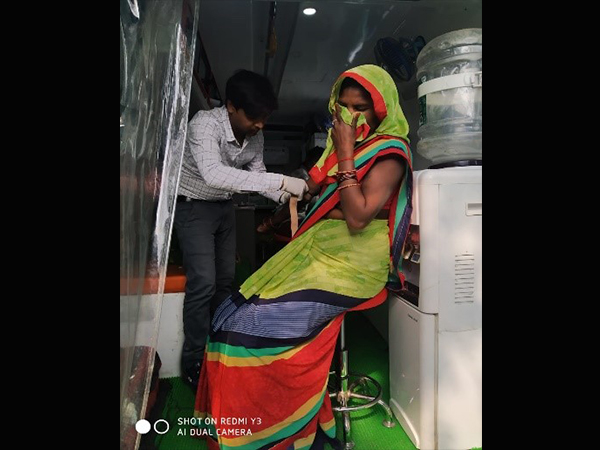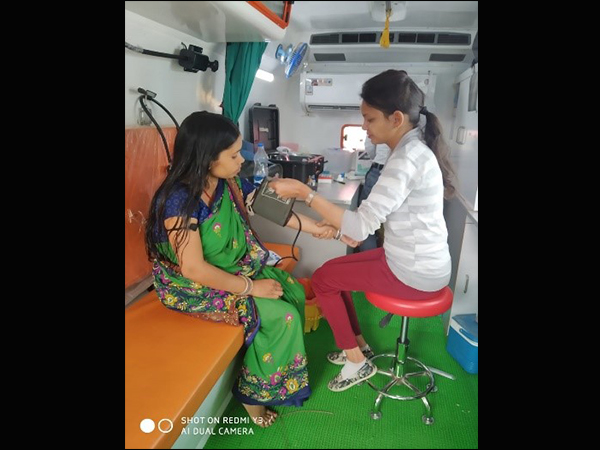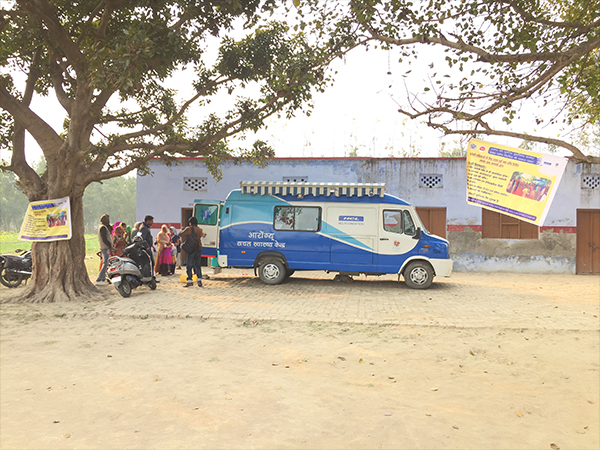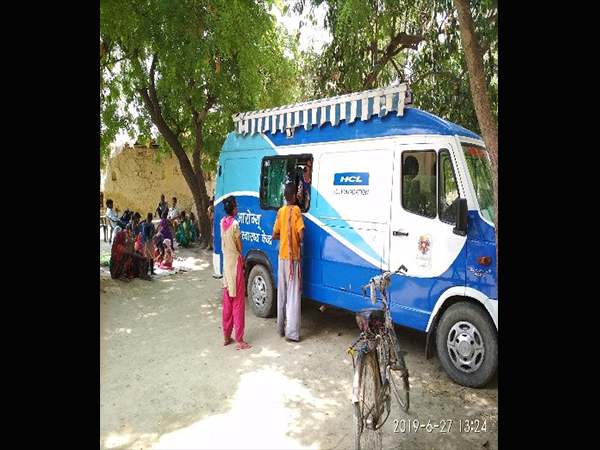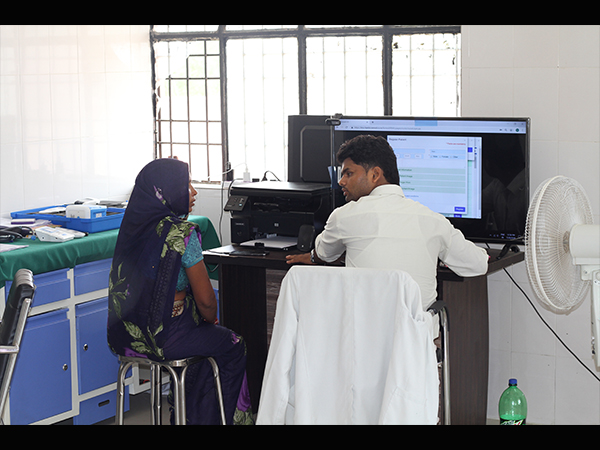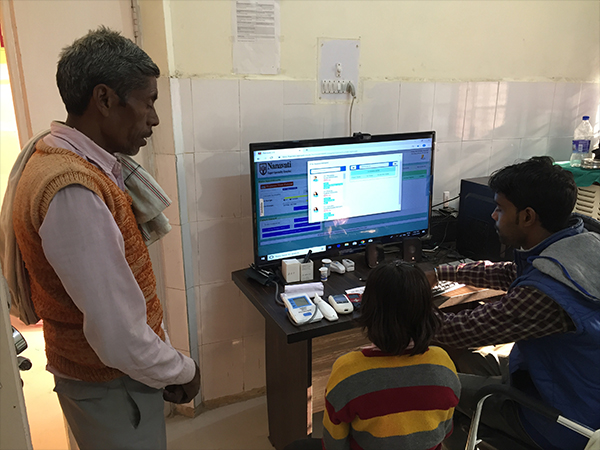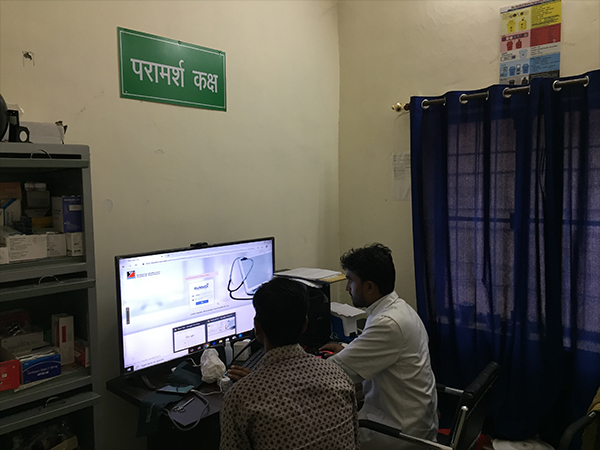HCL Samuday strives to reduce Infant Mortality and Maternal Mortality in the region, and alongside make Primary Healthcare services accessible to all in the community. Primary focus in this sector rests on three themes: (1) building the capacity of health workers to help them carry out their daily responsibilities; (2) improving the health-related infrastructure to make better health facilities available and accessible to all; and (3) increasing community engagement for better health.
While interventions like Mobile Mentoring Van equipped with Nurse Mentors, and Aanganwadi Resource Centre help build the capacity of frontline workers, Infrastructural Strengthening of existing health centres along with Process Improvements therein help improve the supply of healthcare services in the area. Community engagement in existing government/community platforms like VHND, VHSNC, and AAA is qualitatively improved leading to growth in demand from community for better healthcare services; Screening Camps for children followed by Nutrition Camps tackle the mammoth problem of Malnutrition; and Mobile Health Clinics are proving vital in making primary healthcare services accessible to all.
Key Interventions
- Facility Strengthening
- Management of Malnourishment
- Strengthening Community Platforms
- General Health
Facility Strengthening
Conscious of the problems associated with weakened state of infrastructure and inadequate provision of services at health facilities in rural areas, the Facility Strengthening intervention was initiated in 2015 to ensure availability of comprehensive, responsive and sensitive healthcare services to the community reducing their out of pocket expenses on healthcare. Refurbishment and upgradation of dilapidated centers, development of new delivery points and strengthening of services at these facilities are prioritized catering to the urgent need of controlling the underlying factors leading to maternal and neonatal deaths.
13 govt. health facilities including 3 Community Health Centers (CHC), 3 Additional Primary Health Centers (APHC) and 7 Health Sub-Centers (SC) have been strengthened. Of these, 7 facilities including 3 APHCs & 4 SCs have been transformed into new active Delivery Points, improving institutional delivery rate in the region
Management of Malnourishment
Uttar Pradesh is among the states with highest disease burden rate, attributable to malnutrition in children, in India. HCL Samuday uses a three-pronged approach to address this crisis in Hardoi district of the state and thus far has successfully managed 1,732 cases of Severe Acute Malnutrition (SAM) and Severe Under Weight (SUW).
Community based management - For management of non-medically complicated SAM and SUW cases, in a 14-day camp setting, mothers are exposed to key nutrition specific social and behaviour change sessions while the children receive supplemental nourishment according to a fixed diet schedule. Focusing on linkages of nutrition with income generation and agriculture, setting up of a nutrition garden at home is promoted. Efforts in camp are strengthened by a strong follow-up mechanism with the help of local adolescent girls, called Poshan Sakhi, who act as volunteers and go a long way to ensure that children do not relapse.
Facility based management - For management of medically complicated SAM and SUW cases, HCL Samuday supports the Nutrition Rehabilitation Center (NRC) in Hardoi district. The erstwhile 10-bedded NRC has been upgraded to a more child-friendly 20-bedded facility with provision of human resource, thereby making treatment possible for an increased number of chronic malnourished children from across the district.
Model Anganwadi Centers - To improve the quality of services available at anganwadis, Model Anganwadi Centers focus on training and capacity building of anganwadi personnel for growth monitoring & referral mechanism to the NRC. These centers are also upgraded to have child-friendly environment leading to increase enrolment & experience of children for a better non-formal communication learning experience pivotal in initial growth of their cognitive abilities & IQ.
Strengthening Community Platforms
Community participation and ownership is an integral part of any health promotion model for better outcomes in behaviour change and risk management. While working to improve quality of service delivery at health facilities, HCL Samuday strives to enhance awareness levels in the community and help develop a sense of ownership. This is achieved by engaging the residents at multiple platforms like Village Health and Nutrition Days (VHNDs); Auxiliary Nurse Midwife (ANM), Accredited Social Health Activist (ASHA) and Aanganwadi [AAA] meetings; Focused group discussions and personal interactions; Community meetings and campaigns through Jagrukta Express, Nukkad Natak, etc.
528 VHND sessions and AAA meetings, under 66 sub-centers are supported every month through this intervention. Also, sensitization and awareness activities through Jagrukta Express, community meetings, and Inter-Personal Communication (IPC) is regularly carried out across the geography.
General Health
Mostly attributed to difficulty in reaching far flung regions, access to primary health care services has been dismal for rural inhabitants, negatively affecting their health seeking behaviour. This is being mitigated using the following services:
Mobile Health Clinic (MHC) - 6 MHCs are providing free of cost basic health outreach service in villages. OPDs through the MHCs provide medical consultations with an on field MBBS doctor, lab diagnostics (if required), counselling on healthy behaviour and distribution of medicines.
The Mobile health clinics also plays a crucial role in provision of (i) ante-natal care services for expecting mothers through the LabhVan – blood testing initiative to identify high risk pregnancy among pregnant women for timely risk assessment and referral to higher facility; (ii) post-natal care for mother and child; and (iii) nutritional and general medical screening of children (6 to 60 months).
Telemedicine - This facility-based health innovation service utilizes digital, audio- visual information communication technology (ICT) to provide remote healthcare solutions, connecting in real time the doctor from one end of the country to the patient in rural Hardoi. 3 fully functional telemedicine centers provide general care through practitioners of family medicine and specialized care ranging across 17 medical specialties, lab diagnostics & medicine dispensation.
